LATEST NEWS


Complexities
A bag of oranges
doesn’t appear
to be heavy
but hold one
yourself and count
three hundred
cars driving by.
As she stands between
the stack of salty
peanuts and dusty
grapes, the bag
gets heavier and it
retains that heaviness
when it’s passed through
the window; and the driver,
hoisting it onto
the passenger’s seat,
thinks, this is a lot of
fruit for two dollars.
[divider]
Source: “Complexities” first appeared in CQ: California State Poetry Quarterly, Winter 1986-1987; Volume 13, Number 4. It was subsequently selected as one of the poems for the 1988 SMARTS (Santa Monica Arts) Poetry on the Bus project. It also appeared as a spoken word track on Vehemence (New Alliance Records, 1993).
Bill Mohr is an associate professor in the Department of English at California State University,


Last week a Superior Court judge dismissed a final attempt by community groups to score a victory against the Walmart grocery market that opened in Chinatown last year. The groups’ complaint against Walmart brings up a number of factors that undermine the validity of the Chinatown store’s permits. These include zoning and redevelopment requirements that have not been met, poor record keeping by the City, the lack of current California Environmental Quality Act information about the neighborhood, and the fact that the permits were issued the day before a City Council hearing that could have halted the project.
Walmart has long occupied center stage in the national debate about income inequality because of its low wage jobs and ruthless ability to undercut small local businesses. How, then, did the retail giant plant a 33,000-square-foot flag in the middle of Los Angeles’ urban core, despite long-established safeguards designed to protect the unique neighborhood character of places like Chinatown?


Charter schools that receive public money should be held to the same standards as traditional public schools. That’s just common sense.
Unfortunately, many charter schools throughout the country don’t provide all students equitable access, and aren’t transparent and accountable when it comes to public funds.
The House Rules Committee has the opportunity to ensure that a major bill being voted on this week in Congress—H.R. 10, the Success and Opportunity through Quality Charter Schools Act—would require that public charters meet high standards of equitable access, accountability and transparency. To do that, the Rules Committee needs to allow several important amendments to H.R. 10 to come to the floor for a vote. These amendments will help reclaim the promise of public education and require publicly funded schools to operate with integrity.
» Read more about: Congress Weighs Charter School Accountability »
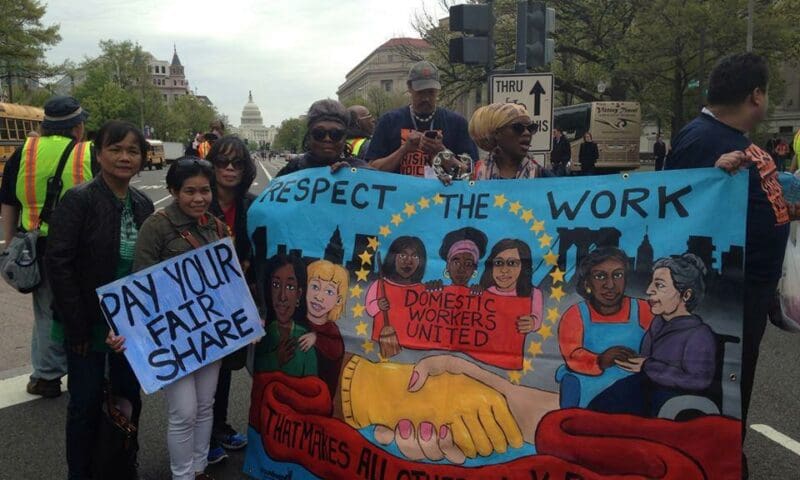
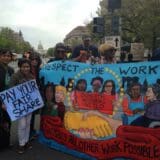
You can find us through Craigslist or fliers at the Laundromat. We live in your homes and prepare your meals. You leave beloved family members in our care. We come from around the globe, often leaving our children behind. But we’re invisible to most Americans. Who are we?
According to Ai-Jen Poo, Director of the National Domestic Workers Alliance, there are 100 million domestic workers in countries throughout the world. In the U.S. they’re key to America’s 21st century economy, caring for children, the elderly and the disabled while family members participate in the workforce. Domestic work is rapidly expanding, she explains, and doesn’t have to represent a road to permanent poverty for its mostly-female workforce.
With 44 local affiliated groups in 26 cities, the Alliance has sponsored legislation throughout the nation to adopt the Domestic Workers Bill of Rights, providing for paid leave,
» Read more about: Domestic Workers: Caring for the American Future »
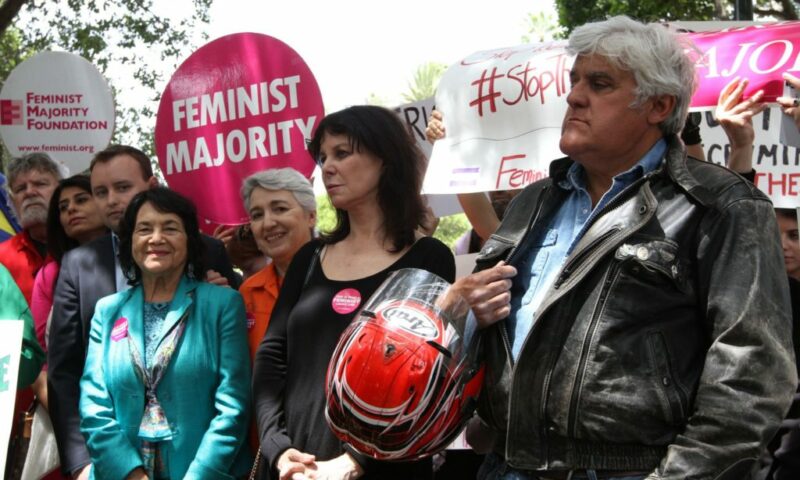

About 80 activists representing feminists, gays and lesbians, workers and Hollywood celebrities rallied in front of the iconic Beverly Hills Hotel Monday afternoon to protest the Sultan of Brunei’s introduction of a brutal version of Sharia law.
Hassanal Bolkiah, who is worth an estimated $20 billion and has been the ruler of Brunei for the last half century, owns the hotel along with the Hotel Bel-Air and other luxury properties around the globe.
The new law technically went into effect last week and will be fully phased in by 2015. It allows for the public flogging of women who have abortions, the stoning to death of gay men and lesbians, and the jailing of women who become pregnant outside of marriage. Thieves could have their right hands and left feet amputated.
Monday’s protest took place in Will Rogers Memorial Park, across Sunset Boulevard from the Beverly Hills Hotel. It was organized by the Feminist Majority Foundation (FMF) and featured former late-night talk show host Jay Leno;
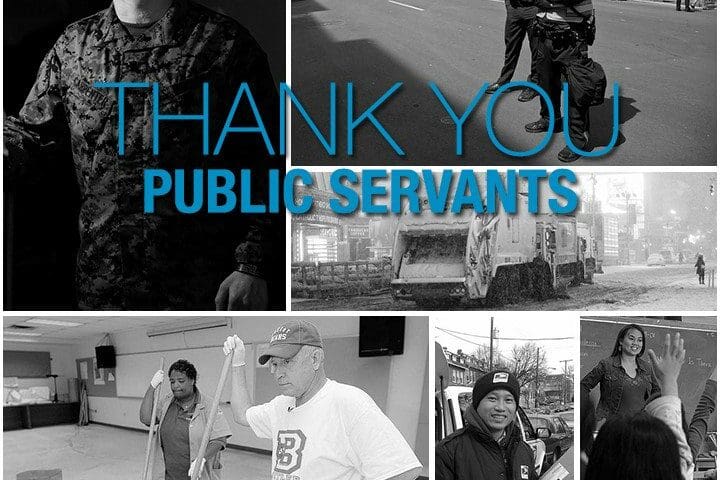

Public servants play important roles in nearly everything we do, but very often they go unnoticed. From food inspectors who keep our food safe to the sanitation workers who keep our neighborhoods clean, we depend on public servants to perform an array of services that make our lives better.
Monday kicked off the first day of Public Service Recognition Week, and we are asking that everyone take a moment to reflect on the importance of these unsung heroes and say thank you.
One easy way you can do that is to download our “Thank You Public Servants” graphic and share it on social media.
You can already find it posted on our Facebook page, and throughout the remainder of the week, we will be using our page to share inspirational stories of public servants who dedicate their lives to improving our communities and our country.
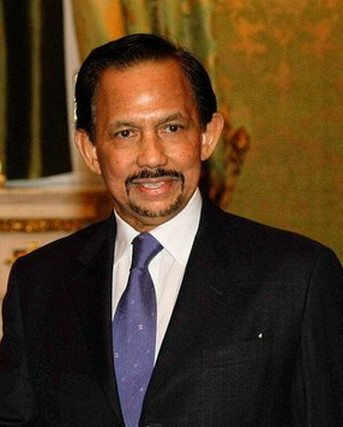

Brunei, the tiny oil-saturated kingdom tucked onto the island of Borneo, recently adopted Sharia law with some gruesome modifications, including death by stoning for homosexual acts, and sentences of flogging and amputation for such lesser “crimes” as having an abortion. The outraged response in Europe and America has been swift and its targets include the Beverly Hills Hotel, the Bel-Air Hotel and other Dorchester Collection Properties, which are owned by the Sultan of Brunei, Hassanal Bolkiah, and the Brunei Investment Agency.
The Feminist Majority Foundation has pulled its annual Global Women’s Rights Awards, co-chaired by Jay and Mavis Leno, from the Beverly Hills Hotel and has launched a massive petition drive and social media campaign calling on the government of Brunei to immediately rescind the new code and asking the United Nations to take action if these laws go into effect as planned.
“We cannot hold a human rights and women’s rights event at a hotel whose owner would institute a penal code that fundamentally violates women’s rights and human rights,”
» Read more about: Brunei’s Brutal Anti-Gay and Misogynist Laws Protested Today »


Lost documents. Incomplete and confusing information. Mysterious fees. Payments received but not applied. Homeowners waiting for a loan modification and suddenly placed in foreclosure. A nightmare of uncertainty, frustration and fear.
These incidents, described to me by numerous homeowners, mortgage counselors and defense lawyers, were supposed to be a thing of the past in California. After revelations of fraud and abuse throughout the mortgage business, including tens of billions of dollars in corporate penalties, state Attorney General Kamala Harris pushed through the 2012 California Homeowner Bill of Rights (HBOR), designed to standardize conduct by mortgage servicers – those companies that manage day-to-day operations on mortgages by collecting monthly payments and making decisions when homeowners go into default and seek help.
Yet one company allegedly committed all these HBOR violations: Ocwen, the nation’s fourth-largest mortgage servicer. According to the complaints, Ocwen (“New Co.” spelled backwards) either skirts around the edges of California law or simply ignores it,
» Read more about: Default Mode: How Ocwen Skirts California’s Mortgage Laws »


Large corporate lobbies have, in recent years, accelerated their push to expand private charter schools. America spends nearly three quarters of a trillion dollars on public education annually and companies such as “cyber-charter” giant, K12 Inc., Rupert Murdoch’s Amplify and Rocketship, a darling of the venture capital industry, see a pot of gold.
A new report by In the Public Interest Scholar Network member Gordon Lafer, for the Economic Policy Institute, examines recent proposals by Wisconsin state legislators to privatize schools, particularly in Milwaukee, and finds that the proposals won’t help poor kids.
How? The proposals call for public schools in the largest and poorest school district to be replaced with private charter schools that substitute online apps for teachers for a significant part of the day. This “blended learning” model primarily focuses on math, literacy and test preparation, while paying minimal attention to other subjects. Also, money earmarked for Milwaukee students is diverted to fund the company’s ambitious growth plans in other cities.
» Read more about: Privatized Education’s Smoke and Mirrors »


Cinco de Mayo is a day to lift up the Mexican culture and clink some margarita glasses in celebration. See our recipe below for that delicious cold cocktail as well as a union-made enchilada that no one will be able to refuse. Viva la fiesta!
For one margarita:
1-1/2 oz. Herradura tequila
1-1/2 oz. Montezuma triple sec
1 to 1-1/4 oz. of lime juice
Salt (Morton or Diamond Crystal) for the rim of the glass
Shake all the ingredients with cracked ice in a cocktail shaker until the exterior frosts. Strain into a glass over rocks, or “up” into a cocktail glass.
Union Enchiladas
(Makes 6 servings)
1 cup Manischewitz chicken stock, or water
3 boneless, skinless chicken breasts (Foster Farms, Tyson), cut into strips
1 jar (12 oz.) Pace salsa
1 cup shredded cheddar (Horizon or Alta Dena)
1/2 cup shredded Monterey Jack (Horizon or Alta Dena)
1/2 cup chopped fresh cilantro
1 can (16 oz.) Old El Paso red enchilada sauce
1 can (16 oz.) Old El Paso green enchilada sauce
Durkee cayenne pepper (optional)
12 Mission soft corn tortillas (six inches across)
Heat oven to 425 degrees.


It’s 5:45 a.m. on Wednesday morning and it’s been a long night for Dennis Martinez and his fellow port truck drivers.
Martinez is nearing the end of a 48-hour strike against Total Transportation Services, Inc. (TTSI), the logistics company for which he has worked for two and a half years. The drivers are about to go through the toughest part of the two-day action – asking the company they have been striking against if they can return to work.
The fatigue shows on Martinez’s face. He hasn’t gotten much sleep but he expected that. He knew taking on a wealthy company wasn’t going to be easy.
A slender man dressed in a gray Aero sweatshirt, jeans and tennis shoes, Martinez is 29 but can pass for a teenager. He keeps headphones in his right ear just in case he needs a pick-me-up from Daddy Yankee and Pit Bull, two of reggaeton’s biggest artists.
» Read more about: Daring to Dream: Portrait of a Port Driver »


We’re excited to announce the creation of In The Public Interest’s ITPI Scholars Network as the next step in our growth and expanding influence on the issues of privatization and outsourcing of public services and assets across the country.
The ITPI Scholars Network brings together academics who are experts in diverse fields that relate to government privatization and outsourcing as well as responsible contracting.
Three members of the ITPI Scholars Network have recently released or are close to releasing studies that have found that careless outsourcing can harm communities, taxpayers and vulnerable residents:
• Dr. Daphne Greenwood of the University of Colorado released her new study The Decision to Contract Out: Understanding the Full Economic and Social Impacts. She found that reductions in contracted wages and benefits leads to a host of negative effects for the community at large; these harms include declining retail sales,
» Read more about: Scholars Network to Analyze Outsourcing and Privatization »
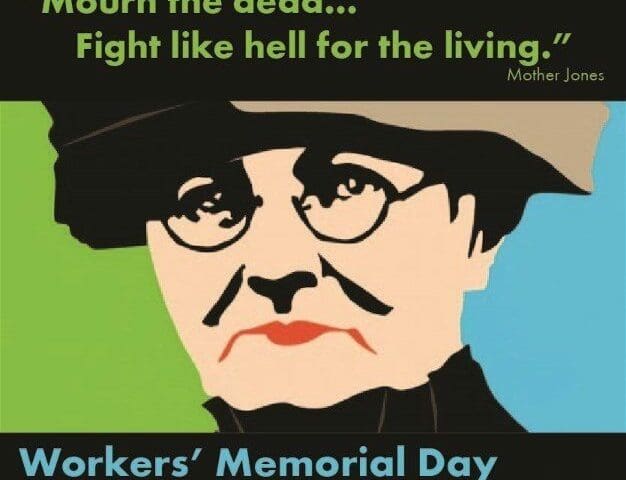
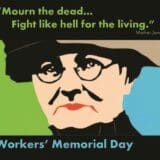
The virtual disappearance of work stoppages in America is hardly a sign of labor contentment but a reminder of how, in today’s hyper-stressed workplace, workers are afraid to protest when they believe their jobs hang in the balance. When a wildcat strike takes place, then, it’s safe to assume there must be powerful motivations behind it.
Baggage handlers working for Menzies Aviation at Los Angeles International Airport saw their 2012 walkout as a matter of life and death. At the time of their strike, three Menzies employees had been killed in California tarmac accidents, prompting workers to file complaints with Cal/OSHA about the workers’ lack of safety training and the company’s cavalier attitude towards faulty electrical equipment and the storage of fuel cylinders. The company took the bad PR and occasional fines in stride, however, and continued to conduct business as usual.
Then, this past February, a worker named Cesar Valenzuela was thrown from the luggage tug he had been driving and run over by the vehicle,
» Read more about: Mourning for the Dead, Fighting for the Living »


My mother went to high school in the early 1950s with Donald Sterling — known in those days by his given name, Donald Tokowitz — but doesn’t remember a thing about him. This could be because Tokowitz was one among hundreds of students at Roosevelt High, but perhaps it was an early metaphor for the future real estate tycoon being a generational anomaly.
By the time she got to Roosevelt, my mom — like Sterling, a child of Jewish immigrants — was steeped in the leftist politics of L.A.’s legendary Eastside neighborhood, Boyle Heights. With sizable numbers of Jews, Latinos, African Americans and Japanese, Boyle Heights was a working class ethnic melting pot in an era when all minorities were subject to varying degrees of the prevailing discrimination targeting anyone who wasn’t white and Christian.
It was also a hotbed of liberal and radical social movements, and the staging ground for some of L.A.’s most effective progressive organizing.
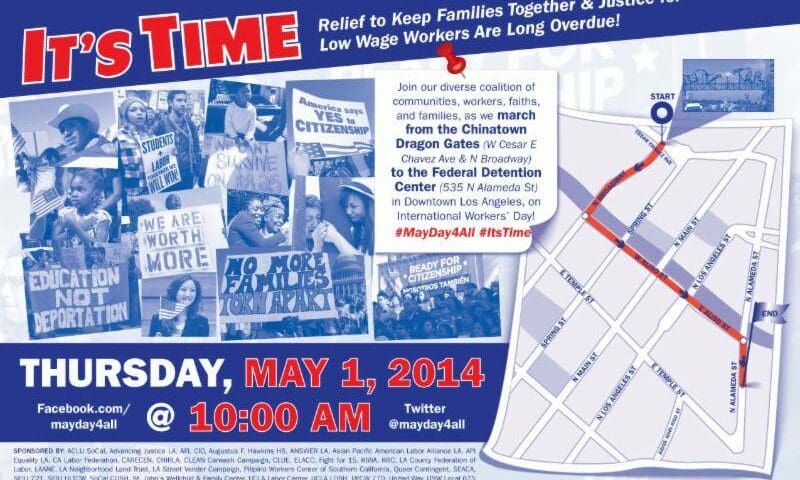

If you’ve had a hankering to visit downtown L.A. to sample artisanal sushi or to nail down a sale on that special luxury loft, Thursday, May 1, might not be the best day. If, however, you’re in the mood to demand that Congress pass immigration reform, or to call for the raising of the minimum wage or to honor the 5,000 American workers who died on the job last year, definitely drop by. The action begins 10 a.m. at Chinatown’s Dragon Gateway (Cesar Chavez Ave. and Broadway) and will move to the Federal Detention Center at 535 N. Alameda St., where marchers will demand the release of undocumented Americans.
Bring plenty of water, a hat or parasol, and any chant that begins, “Two, four, six, eight –” Brought to you by the Los Angeles County Federation of Labor.
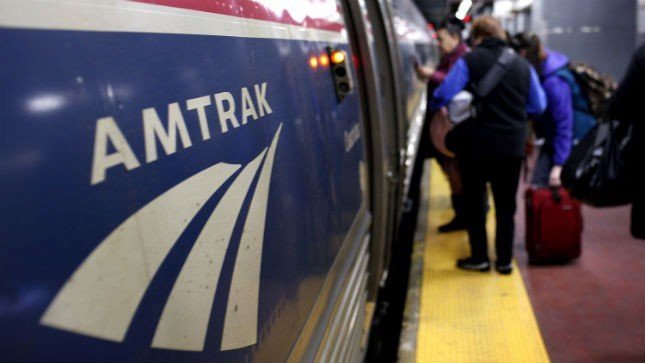

As a college sophomore in the late ’80s, I didn’t have the benefit of Wikipedia or the Google. Instead, the holy grail of research was a black and yellow study guide called CliffsNotes. These heaven-sent summaries of major literary works were a lot easier to read than the originals.
During one quarter, I took a philosophy class where I was assigned to write an essay on Plato’s The Republic. It was springtime in the Bay Area, so the last thing I wanted to do was write the essay. After a visit to the campus bookstore, I devised a strategy to quickly complete my assignment: Summarize the CliffsNotes, and then tack on some class lecture notes. I thought my plan was foolproof — until the professor returned my essay a couple of weeks later. In bright red, he marked comments up and down the margins and in between paragraphs,
» Read more about: Railcar Investment & Jobs: A Teachable Moment »

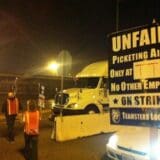
The 48-hour strike by harbor truck drivers ended at dawn today. The haulers have returned to work after drawing an unprecedented amount of public attention to their cause – and without facing dismissals or other forms of retaliation from the three companies they targeted. Those firms — Pacific 9 Transportation, Total Transportation Services, Inc. and Green Fleet Systems – stood accused by the drivers of misclassifying them as “independent contractors,” even as a growing body of labor court rulings shows that the truckers are company employees. As such, they should be entitled to overtime wages, workers compensation, disability and an array of other benefits.
By being placed in the limbo of contractor status, however, the drivers are responsible for all their trucks’ upkeep, fuel and insurance. As a result, like the vast majority of American truckers, port drivers in Los Angeles and Long Beach must subsist on poverty wages.
Some of the drivers joined the work stoppage,
» Read more about: Port Truckers End Strike, Return to Work Without Retaliation »
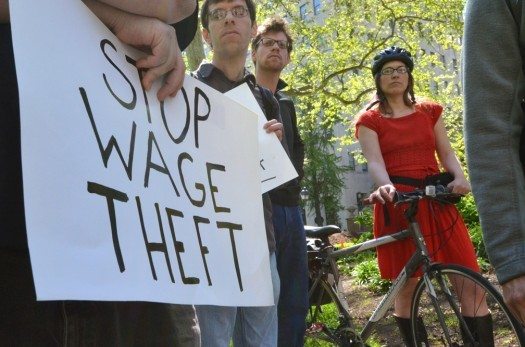

The gaudy evidence of income inequality is all around us: stratospheric CEO “wages,” private plane shuttles to Coachella, gated enclaves and all the rest. But few things say “class war” more eloquently than wage theft, the practice by unscrupulous businesses of short-changing their employees by undercounting work hours or shaving off time for breaks that were never taken.
Wage theft is probably about a minute older than ancient history’s first labor handshake and partly exists because most workers who suffer it are too financially insecure to complain. Now, however, there is increasing pushback from some city and state governments, and from workers themselves –McDonald’s low-wage employees have filed class action lawsuits in several states to recover wages they allege were gouged from their paychecks.
In California, Assembly Bill 2416 (“California Wage Theft Prevention Act”), introduced by Mark Stone (D-Monterey Bay), seeks to curb wage theft by allowing workers to file liens against the real and business property of employers they claim owe them wages.
» Read more about: Lien In: New California Bill Seeks to Curb Wage Theft »
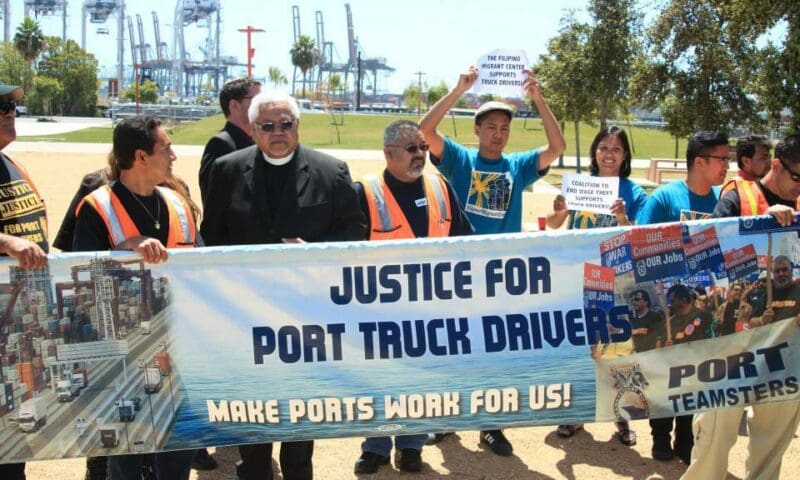
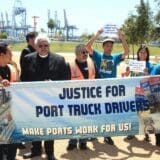
Port truck drivers today continued a 48-hour strike to press their demand to be treated as employees of trucking companies rather than as independent contractors. The distinction is crucial to thousands of drivers who service the nation’s largest port complex, including the more than 100 strikers who drive short hauls for Pacific 9 Transportation, Total Transportation Services, Inc. and Green Fleet Systems. Currently misclassified by the companies as private contractors, these drivers, like the majority of U.S. port truck drivers, are denied overtime wages, workers compensation, disability and a host of other benefits, and must pay for the fuel and maintenance of their vehicles. Furthermore, after paycheck deductions many drivers earn poverty wages despite working long hours during six-day weeks.
At a noontime media event held in Wilmington Waterfront Park, TTSI driver Dennis Martinez told a crowd that “We had to strike because they didn’t want to listen. They didn’t want to deal with us.”
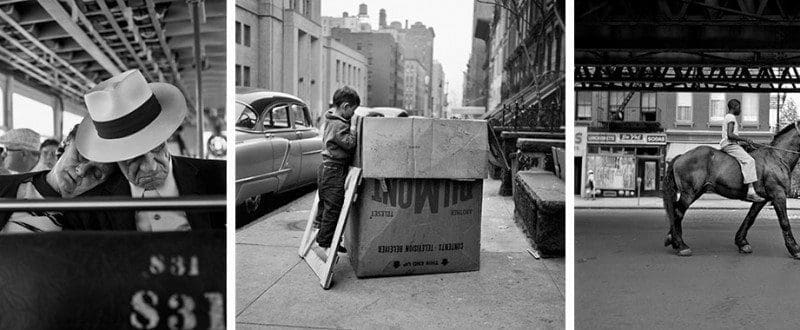

Photographer Vivian Maier spent her last months on a park bench overlooking Lake Michigan, her secret life boxed up in storage units around Chicago. Her tens of thousands of negatives, 16mm films and voice recordings (not to mention newspaper clippings, receipts, unopened IRS refunds, blouses and hats) could easily have disappeared into obscurity if it weren’t for a young real estate agent and amateur local historian, John Maloof, who has a penchant for auctions and flea markets.
If you enjoy photography and the unpredictability of human existence you’ll enjoy Maloof’s film, Finding Vivian Maier. The documentary describes an eclectic journey to unearth the life and motivations of an eccentric subject, an artist who never sought to have her pictures displayed or published.
Maier seemed to have trouble making close human connections, but with her camera she was uncanny in creating intimacy with the widely diverse life on the streets of Chicago and New York.